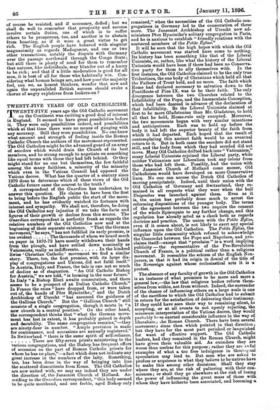THE NEW FORM OF INTERNATIONAL GREED.
ONE of the worst and most dangerous features in the international relations of the present day, is the development of a new kind of greed. Greed, it must be admitted, has always played a great part in international politics, has influenced Kings and excited peoples, but till lately it has been almost entirely greed for territory. There have been efforts, especially among Englishmen, to obtain trade by war, and the long period of hostility between ourselves and Spain was caused not only by fear of the Spanish ambition to found a world-wide monarchy —in which, had the despatch of the Armada ended in the conquest of England, Philip II. might have succeeded— but by a craving desire to wrest from Spain her monopoly of the gold and silver mines of the New World. The buccaneers of Elizabeth's time, and of James I., bated Spain alike for her creed and for her cruelty, but they hungered for gold too, as Raleigh, for example, confessed. Still, the great material object of war was territory, dominion, wider expanses of populated and taxable land. Philip II., Louis XLV., our own Whig oligarchy, Frederick the Great, Napoleon I., all wanted provinces, and obtained them, temporarily at all events, by the sword. France, for instance, fought us in America and India with that object first of all, and a successful treaty was always one which handed over provinces or " possessions." In 1815, for example, the Kings and diplomatists who redistributed Europe, all spoke of the cession or acquisition of so many " souls " as a sort of common denominator. It was a bad kind of greed, but it had this advantage,—that it was in a way calculable, and had limits. States- men knew fairly well what other statesmen wanted, and could make alliances and combinations accordingly. It was certain, for example, that Britain wanted no land upon the Continent, that France cared only or mainly for land which touched her frontier, that Prussia did not desire possessions out of Germany. The alarming element of vagueness was absent from the ambition of the nations.
At present the land-hunger has receded almost out of politicians' sight, superseded, as it were, by a newer and more dangerous greed. France, it is true, took Savoy and Nice from their owners ; Germany, Alsace-Lorraine ; Austria, Bosnia and Herzegovina ; and there are provinces, and even kingdoms, like Servia and Bulgaria, which are objects of incessant intrigue ; but the nations are more excited by the desire for actual wealth. As the root of Socialism is the thirst of the poor for more physical comfort, better food, better lodging, and more leisure, so the root of international jealousy is the thirst for a larger national fortune, to be rid of a general poverty which diminishes too slowly for the increase in the general sense of wants, a sense produced in the main by advancing intelligence. The peoples are eagerly scanning the roads to wealth, and find them not in industry and redueed taxation, but in tropical possessions, in foreign trade, in the immense businesses based upon "concessions," that is, in reality, upon mining rights, State contracts, and monopolies of all descriptions. The Governments are urged to " divide Africa," to found colonies like German East Africa, to conquer kingdoms like Madagascar, to secure " treaty rights " over pro- fitable trades, even to use their political strength to secure bargains like the supply of rails to China, or the monopoly of mineral oil in Russia, or the supply of some single article like tobacco to the people of Turkey. The home market is guarded as if it were a property, and the intrusion of foreigners into the colonial market rouses against them the kind of feeling with which the buccaneers were once regarded in Spain. France is one of the greatest States in the world , but its Government was lately threatened with overthrow, because the Administration of Algeria had granted a monopoly of some phosphates to a British Company. Nay, the popular cry went even further, and, as we reported last week, the French colonists of Tonquin were denounced as traitors because they ventured to request permission to buy goods out of France. Of course, with the popular temper in such a state, any nation which is active is sus- pected of seeking gain, and half the Continent believes at this moment that English interference for the Armenians is dictated by a hope of obtaining specially profitable trades in Turkey, or, perhaps, of discovering another auriferous region in Armenia. In particular the thirst for gold in its concrete and tangible shape has broken out everywhere almost as strongly as it broke out in the sixteenth century among Spaniards, Portuguese, and Elizabethan Englishmen. Mines, it is believed, on the Continent, are the swiftest, perhaps the largest, of all wealth producers, and not to possess them is to be poor. One great cause of the sudden exaltation of the jealous hatred of Great Britain is a belief that we have been sud- denly enriched by new discoveries of mines yielding not only precious metals but even diamonds and rubies, shares in which have recently excited a mania of specula- tion in Paris, Vienna, and Berlin. Look, say the hungry Continentals, at the wealth those selfish English are obtaining in Australia, South Afrioa, British Columbia, and British Guiana, digging it out of the very ground. Why should those insolent islanders, with no conscription, have all that, and we nothing except what we can make by tilling exhausted soils, or competing with all the world for the sale of our still very feeble manufactures ? We will have some of the really fat things, if we have to fight for them. The French have been persevering in Madagascar because they expect to find gold. The Germans are eager for the independence of the Transvaal because it is a vast gold region, which may ulti- mately, they fancy, fall to them. Even the Japanese have been lured to Formosa by hopes, probably well founded, that the island may be found to be one of the " metalliferous patches " of the world. There is a positive frenzy of greed developed in the active nations which lends heat and purpose to every accusation against England, and we ourselves are not innocent in the matter. Most of our mines came to us long before the thirst for mining began, but though it is culturable territory that we have first of all sought in South Africa, our necessity being emigration, there can be no doubt that the search for gold has influenced both our policy and our colonisation. It has not influenced our Government much, or we should never have invested the Boers with property rights in the Transvaal, or given up so easily our claim to Madagascar ; but it has influenced financiers, traders, and the hosts of adventurers who have followed upon their footsteps. Lobengula was a horrid savage who at last took to murdering our people ; but if his dominion had been merely prairie, we suspect he would have been reign- ing still. The Americans, who are like us in temperament, except that they are sensitive, have no foreign territories to exploit ; but they would themselves admit that one key to their internal politics is the desire, rising to a furious passion among the governing men of their silver- yielding States, to raise the price of that metal to its ancient level. It is the greed of multitudes, not any financial necessity, which has given the " Silverites " such a position in the Senate that no tax Bill can be passed which does not in some way favour their views, and that no proposal for a single gold standard can obtain so much as a fair hearing.
We do not know that it is of any particular use to moralise upon this outbreak of international greediness, which is only remarkable because it has seized upon such vast populations at once. The world has known the symptoms of the gold-fever for many hundred years, and has agreed to treat the gold-thirst as a feature in human nature rather than an aberration. If gold has been found near a city, no one will remain at work ; even military discipline is shaken, and no force short of mili- tary law, which has death for its ultimate sanction, will keep employ6s faithful to their duty. Nations are but collections of individuals, and we do not wonder, therefore, at France and Germany, and even America, regarding British success in gold-finding with envious or angry eyes. Our object is rather to point out to our countrymen that this is the fact, and to bid them remember that they cannot run so hard as they have recently been doing in this race for wealth, without stirring up bitter animosities. Most of those animosities are unjust, for we have but utilised our own property, as we are bound to do, and in no case have we excluded any other European nationality ; but still they exist, and must be reckoned with. When they lead our rivals to oppress and threaten us, those rivals must of course be resisted, and if necessary, defied ; but we shall do well to remember that prosperity and success involve certain duties, one of which is to suffer others to be prosperous, too, and another is to abstain from boasting, as if it were a great virtue to get rich. The English people have behaved with singular magnanimity as regards Madagascar, and one or two other transactions, notably the dispute with Germany over the passage northward through the Congo State ; but still there is plenty of need for them to remember that nations, like individuals, may blunder out of a hurry to be rich ; and that if a little moderation is good for all men, it is beet of all for those who habitually win. Con- sidering what human beings are, and how poor the majority feel, can we, as honest thinkers, wonder that now and again the unparalleled British success should evoke a chorus of angry expletives from lookers-on ?



































 Previous page
Previous page